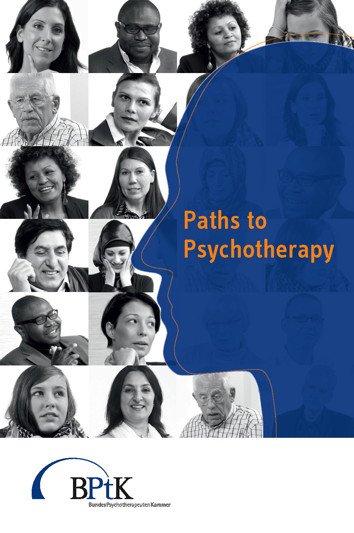Basic Principles
Psychotherapy is the generic term for a wide range of different types of psychological procedures.
 What they all have in common is the treatment of mental and psychosomatic conditions. What distinguishes them is that the therapist can use various media to cure a mental condition. The discussion between the patient and the therapist should be mentioned first and foremost here; but performing media such as drama, sound, colours and movement are also made use of here. According to the media used, a distinction is drawn between non-directive psychotherapy, behaviour therapy, body therapy, Gestalt therapy, psychodrama, systemic family therapy etc.
What they all have in common is the treatment of mental and psychosomatic conditions. What distinguishes them is that the therapist can use various media to cure a mental condition. The discussion between the patient and the therapist should be mentioned first and foremost here; but performing media such as drama, sound, colours and movement are also made use of here. According to the media used, a distinction is drawn between non-directive psychotherapy, behaviour therapy, body therapy, Gestalt therapy, psychodrama, systemic family therapy etc.
Psychoanalysis stands out from these psychotherapeutic treatments in that it is the only one that focuses consistently on unconscious relationships and analyzes their relevance to the patient’s current situation. It is based on the knowledge that our experience and behaviour are controlled to a great extent by unconscious relationships. These have such a powerful effect for the very reason that they unfold unconsciously, i.e. unnoticed and therefore without themselves being influenced. The consequence of this knowledge is that we often cannot desist from irrational and self-defeating behaviour because we are (still) unaware of the motives. We have only incomplete insights into what underlies our desires, actions and plans.
Self-therapy is therefore impossible. To treat and cure our mental problems we must call on the services of a therapist who understands how to enable us to access the unconscious. This ability is the mark of the psychoanalyst. Discussion with the psychoanalyst enables the patient to overcome the past so allowing him to approach the future all the more unselfconsciously and with open expectations.
Psychoanalysis is the name for a method of examining and treating mental / unconscious processes which are otherwise barely accessible. Problems of identity, self-esteem and communication that are based on the unconscious can be revealed and clarified through forms of psychoanalytical therapy. The unconscious aspects of current conflicts are to be sought in the individual life story of the individual. We frequently process hurtful and traumatic experiences by repressing them, by making them unconscious, or by using some other mental defence mechanisms. In this way we want to protect the integrity of our ego.
Yet this is only a would-be form of protection. For even if what we have distanced ourselves from is no longer accessible for us, it still retains its agitating power and effectiveness. Distressful conflicts from the past which have become unconscious for us can crop up in later life as symptoms of mental illness. At the same time we are unaware of the complete historical connection of these conflicts. We only register the symptoms of our condition, manifesting themselves in the form of fear, depression or psychosomatic illness.
go to top

